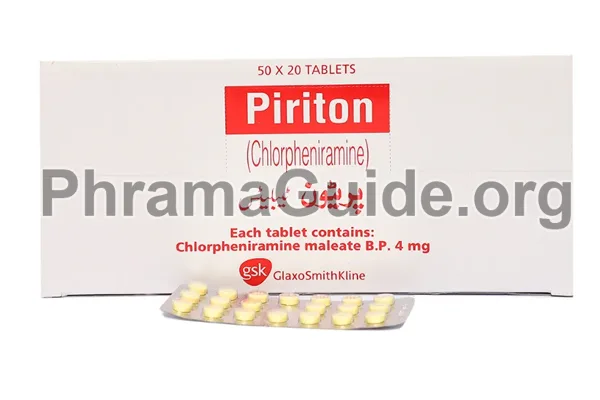Piriton tablet is primarily used to treat allergic reactions, hay fever, and the common cold. It belongs to the first-generation antihistamine class of medications. Following are some common uses of the Piriton tablet:
- Allergic Rhinitis: Piriton tablet is used to alleviate the symptoms of allergic rhinitis, also known as hay fever. It helps relieve sneezing, itching, runny nose, and nasal congestion caused by allergies to pollen, dust mites, animal dander, or other allergens.
- Allergic Conjunctivitis: Piriton tablets can be used to treat allergic conjunctivitis, which is inflammation of the conjunctiva (the clear tissue that lines the inside of the eyelids and covers the white part of the eye). It helps reduce itching, redness, and watering of the eyes caused by allergic reactions.
- Urticaria (Hives): Piriton tablets may be used to relieve the itching and reduce the appearance of hives (raised, itchy bumps on the skin) associated with allergic reactions.
- Allergic Dermatitis: Piriton tablets can be used to manage the symptoms of allergic dermatitis, a condition characterized by skin inflammation and itching caused by exposure to allergens such as certain foods, plants, or chemicals.
Off-label Uses of Piriton Tablet
- Motion Sickness: Piriton tablet has been used off-label to help relieve symptoms of motion sickness, such as nausea and dizziness. Insomnia: Due to its sedating effects, Piriton tablet has been used as a short-term sleep aid in some cases. It may help induce sleep and alleviate difficulty falling asleep or staying asleep.
- Cough: Piriton tablet has been used to suppress cough in certain cases. It can help alleviate coughs associated with allergies or upper respiratory tract infections.
- Pruritus (Itching): Piriton tablet has been used to relieve itching associated with various conditions, including dermatitis, eczema, or insect bites. It helps reduce itching by blocking histamine receptors in the skin.
- Chickenpox: In children aged 2-11 years old, Piriton is used for the treatment of mild cases of chickenpox or measles complications, such as fever or rash.
- Opioid Withdrawal Symptoms: Piriton tablets can also used to alleviate some symptoms associated with opioid withdrawal, such as anxiety and stomach pain/nausea/vomiting due to its anticholinergic properties.
- Medical Condition Induced Nausea Vomiting: Piriton tablet has antinauseant properties that make it useful for treating nausea-related symptoms from chemotherapy regimens in cancer patients or morning sickness during pregnancy.

What is Piriton?
Piriton is one of the leading brands of Chlorpheniramine, manufactured and marketed by Glaxosmithkline Pharmaceuticals Ltd (GSK).
Piriton Tablet’s Alternatives : Other Chlorpheniramine Brands
The following are some alternative brands of Piriton Tablet and their manufacturers.
- Histagic : Lisko Pakistan (Pvt) Ltd.
- Allerphene : P. D. H. Pharmaceuticals (Pvt) Ltd, Pakistan.
- Allervil : Indus Pharma (Pvt) Ltd, Pakistan.
- Alphem : Alson Pharmaceuticals, Pakistan.
- Apiton : Euro Pharma International, Pakistan.
- Bariton : Batala Pharmaceuticals, Pakistan.
- Chilorilex : Lexicon Pharmaceuticals (Pvt) Ltd, Pakistan.
- Chlorphenir : Orient Laboratories, Pakistan.
- Chlortab : Wilshire Laboratories (Pvt) Ltd, Pakistan.
- Deemine : Delux Chemical Industries, Pakistan.
Piriton : Available Formulations and Strengths
Presently, Piriton is available in Tablet and Syrup forms.
Piriton Tablet : Chloropheniranie 4mg strength.
- Chloropheniramine 2.5mg/5ml
- Sodium Acid Citrate 55mg/5ml
- Ammonium Chloride 125mg/5ml
- Glycerin 750mg/5ml strengths
Who Should Not Use Piriton?
Piriton has several contraindications, which are specific situations or conditions in which the use of the Piriton is not recommended.
Hypersensitivity: Piriton is contraindicated in individuals who have a known hypersensitivity or allergy to Piriton or any other components of the medication. Allergic reactions can range from mild skin reactions to severe systemic reactions and require immediate medical attention.
Newborns and Premature Infants: Piriton is generally not recommended for use in newborns or premature infants due to their increased sensitivity to antihistamines. Consult with a pediatrician for appropriate alternative options in these cases.
Acute Asthma or Lower Respiratory Tract Symptoms: Piriton is contraindicated in individuals with acute asthma or lower respiratory tract symptoms, such as acute exacerbations of chronic obstructive pulmonary disease (COPD). It may cause thickening of bronchial secretions, leading to respiratory complications.
Narrow-Angle Glaucoma: Piriton is contraindicated in individuals with narrow-angle glaucoma, a type of glaucoma characterized by increased intraocular pressure. Antihistamines can exacerbate this condition by causing pupillary dilation and increasing intraocular pressure.
Urinary Retention: Piriton is contraindicated in individuals with urinary retention, as it can worsen this condition by affecting the muscles in the urinary system and impairing normal urination.
Severe Liver Disease: Piriton should be used with caution in individuals with severe liver disease, as it can potentially exacerbate liver impairment. Adjustments to the dosage or alternative treatment options may be necessary in such cases.
Pregnancy / Breast-feeding: Piriton should not be used during pregnancy or breastfeeding unless specifically recommended by a doctor since it can pass into breast milk and potentially harm to baby’s health.
What is the Recommended Daily Dosage of Piriton Tablet?
Piriton Tablets Dosage :
For Adults and Children (over the age of 12 years): Take 1 tablet every 4-6 hours (maximum 6 tablets in 24 hours).
For the Elderly: Take 1 tablet every 4-6 hours (maximum 3 tablets in a day).
For Children (6-12 years): Dose 0.1mg/kg body weight. Take half a tablet every 4-6 hours (maximum 6 half tablets in a day).
Piriton Expectorant Dosage :
For Adults and Children (over the age of 12 years): 8ml every 6 hours.
For Children (6-12 years of age) 4 ml every 6 hours.
Piriton is not recommended for the age group below 6 years.
How Piriton Works?
Piriton works by binding to histamine receptors, particularly the H1 receptors. By binding to these receptors, Piriton blocks the action of histamine and prevents it from exerting its effects. This antagonistic action reduces the allergic symptoms triggered by histamine release.

Leave A Comment